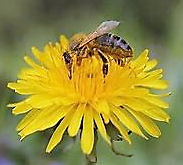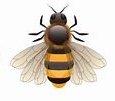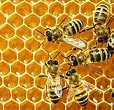Imagine a world without crunchy apples, juicy pears, luscious straw berries, fresh vegetables and even ice-cream! A world where one third of your diet would disappear and your health would suffer! This is the stark reality facing our planet if scientists cannot find an answer to the baffling syndrome of “colony collapse disorder” within the honeybee community.
Bees have been declining in numbers for the past few years but this disaster has grown to epic proportions with beekeepers reporting a huge number of empty hives. The reason for this is not at all clear as bees are flying off in search of pollen or nectar but are failing to return to their beehives. No dead bees are being found nearby, suggesting that they are unable, for some reason, to find their way home. Researches have come up with a variety of possible causes, one being that the bees are absolutely exhausted or disoriented due to over work and are falling victim to viruses attacking their immune system.
Bees no longer only produce honey for us to eat but are being used more and more to pollinate crops. So much so that nomadic beekeepers travel from state to state within countries, hiring out their bees for pollination purposes. This means that the bees are working for a much longer season and their immune system may be affected.
The use of certain pesticides on crops is another reason being given for the decline in bee numbers. When the bees go out to pollinate the crops, they could possibly be affected adversely by these pesticides. Some European countries have banned the farmers from using specific pesticides in an attempt to alleviate the bee problem. Other reasons being suggested are: Viruses, fungus or poor bee nutrition. Also the discovery of mites within the beehives is a common occurrence and the beekeepers have been using insecticides to kill them off resulting in the Queen bee having a shorter life span.
Whatever the reason for this path to extinction within the honeybee community, scientists must find a solution to the problem soon. Honeybees are vital to the food chain that provides food for your table. If that link is broken, your diet may very well change considerably and your health may suffer. The honeybee may be small in size but it plays a large part within the economy and nutrition.
Next time you hear a bee buzzing around and are tempted to swat it, remember the part it plays in putting food on your table thus keeping you healthy. Let it pass on its way safely back to its hive.






Here is really good, every time to have a new harvest!
I never realised how important bees were. I just thought all small flying creatures sting. I will be more careful now.
Now I know why my daughter tells me not to kill bees.